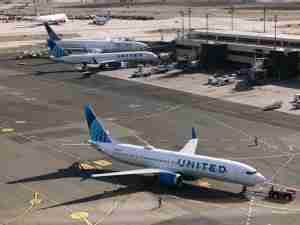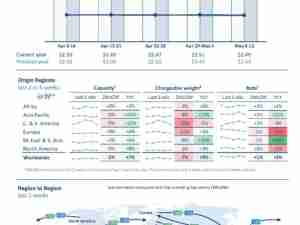U.K. supermarkets issued their starkest warnings yet about Brexit, saying it’s weighing on consumer confidence, splitting communities and threatening to leave holiday dining tables short of fresh food.
The Oct. 31 date for Britain leaving the European Union comes at the most crucial time for the industry in the run-up to Black Friday and Christmas, and the prospect of a no-deal scenario is worsening the outlook, according to John Lewis Partnership Plc, the owner of high-end grocer Waitrose.
“Should the U.K. leave the EU without a deal, we expect the effect to be significant and it will not be possible to mitigate that impact,” Chairman Charlie Mayfield said in a statement.
Rivals chimed in with similar cautions as they reported earnings Thursday. Wm Morrison Supermarkets Plc said the October deadline will come after the British growing season for salad and fruit, increasing reliance on European imports. It blamed a 1.9% drop in quarterly sales on weak consumer confidence caused by Brexit uncertainty. Co-Operative Group Ltd. expressed concern for British farmers, cited the “deep divisions” Brexit has caused in communities, and warned of possible food shortages and higher prices.
Pressure Building
The focus on Brexit in Thursday’s earnings statements suggests the food retailers feel the pressure mounting. The government published a document late Wednesday detailing the worst-case scenarios if no Brexit agreement is reached, warning of fewer supplies of fresh food and reduced choice and availability, which could impact the most vulnerable consumers and spur panic-buying.
To mitigate risk, Morrison said it plans to build stock of extra packaging and non-perishable goods and will find alternative routes for goods coming into the U.K. from Europe to avoid the Calais-Dover crossing. It will activate the plans in a few weeks, once it’s clear whether there will be an exit deal, Chief Executive David Potts said by phone.
Morrison said in March that some customers had begun stockpiling painkillers and toilet paper. Co-op said on Thursday that it had seen similar trends.
A disorderly Brexit could result in disruptions to the availability of labor and food supplies, and lead to increased funding costs, Co-op Chief Executive Officer Steve Murrells said in a statement Thursday. Co-op is stockpiling essential items like water, toilet paper and canned goods. He said the company is also exploring the use of air-freight to import products like apples, pears, blueberries and strawberries, while noting that would be an expensive solution.
“We’re mindful of how Brexit has exposed deep divisions within our communities, with strong feelings of disempowerment and neglect expressed by many,” Murrells said in the statement. “These are serious matters that an economic resolution to Brexit will only partially address.”
Britain’s two biggest grocers, Tesco Plc and J Sainsbury Plc, warned in July that the government couldn’t have picked a worse date for Britain to leave the EU, because that’s when companies boost stock for the festive period.









